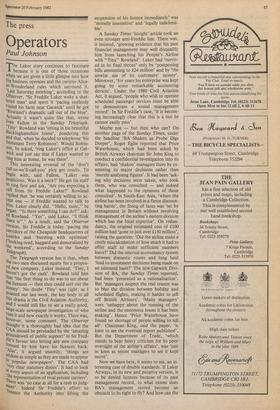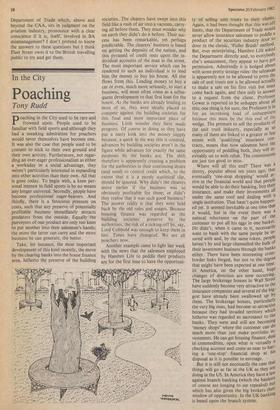The press
Operators
Paul Johnson
The Laker story continues to fascinate because it is one of those occasions When we are given a little glimpse into how big business operates and the curious Alice- in-Wonderland rules which surround it. `Last Saturday molting', according to the Observer, 'Sir Freddie Laker woke a shat- tered man' and spent it 'pacing restlessly round his farm near Gatwick' until he got c Rowland's dramatic call out of the blue'. Actually it wasn't quite like that, wrote Ivan Fallon in the Sunday Telegraph. _TioY' Rowland was 'sitting in his beautiful Buckinghamshire home', pondering this and that, when he decided to telephone 'his lieutenant Terry Robinson'. Would Robin- son, he asked, 'ring Laker's office at Gat- wick and just say that if Laker wanted to flog him at home, he was there'.
This interesting reversal of the 'don't callus-we'll-call-you' ploy got results. To begin with, said Fallon, 'Laker was suspicious. Was it a hoax?' He got his staff to ring first and ask, 'Are you expecting a call from Sir Freddie Laker?' Rowland replied that 'he was certainly willing to ac- cept one — if Freddie wanted to talk to began. Laker clearly did. "Hello, mate," he °egan. "Is there something I can do?" ask- ed Rowland. "Yes", said Laker, "I think there is".' As a result, said the Observer version Sir Freddie is today 'pacing the corridors of the Cheapside headquarters of Lonrho and 'bursting with optimism' ( looking tired, haggard and demoralised by the weekend', according • to the Sunday Telegraph). The Telegraph version has it that, when the two men discussed equity for a propos- ed new company, Laker insisted: 'Tiny, I haven't got the cash'. Rowland told him that 'the first thing to do was to see about the licences — then they could sort out the money'. No doubt 'Tiny' was right: as I Pointed out last week, the key body in all this drama is the Civil Aviation Authority, and I would still like to see a really good, large-scale newspaper investigation of who runs it and how exactly it works. There was, however, some comment. The Observer thought it a thoroughly bad idea that the CAA should be persuaded by the 'amazing groundswell of public support' in Sir Fred- die's favour into letting any new company formed by him have his licences back. Alas', it argued snootily, 'things are !Odom as simple as they are made to'appear 1,11 Popular newspapers'. The CAA had very clear statutory duties'. It had to look at every aspect of an application, including _the representation of rival private carriers'. There was `no case at all for a rush to judg-
li, Indeed Sir Freddie's effort to bounce the Authority into lifting the suspension of his licence immediately' was `morally insensitive' and 'legally indefensi- ble'.
A Sunday Times 'Insight' article took an even stronger anti-Freddie line. There was, it insisted, 'growing evidence that his past financial management may well disqualify him from launching his People's Airline with "Tiny" Rowland'. Laker had 'surviv- ed in its final throes' only by 'postponing bills amounting to £24 million' and by 'the unwise use of its customers' money'. Moreover, 'for years his enterprise was kept going by some remarkable accounting devices'. Under the 1980 Civil Aviation Act, it argued, 'people who wish to operate scheduled passenger services must be able to demonstrate a sound management record'. In Sir Freddie's case, 'it is becom- ing increasingly clear that this is a test he cannot easily pass'.
Maybe not — but then who can? On another page of the Sunday Times, under the headline 'BA Shaken as Probe Digs Deeper', Roger Eglin reported that Price Waterhouse, which had been asked by British Airways chairman Sir John King to conduct a confidential investigation into its affairs, had 'shaken' managers there by ex- amining its major decisions rather than `merely analysing figures'. It had been 'ask- ing why decisions were taken, who took them, who was consulted — and indeed what happened to the opinions of those consulted'. In South-East Asia, 'where the airline has been involved in a fierce discoun- ting battle', the fixing of fares was 'set by management in Britain without involving management of the airline's eastern division which has the local expertise'. On redun- dancy, the original estimated cost of £100 million had 'gone to just over £150 million', raising the question: 'Did the airline make a costly miscalculation of how much it had to offer staff to make sufficient numbers leave?' Did the internal accountancy system between domestic routes and long haul 'lead to investment decisions being made on an unsound basis?' The new Gatwick Divi- sion of BA, the Sunday Times reported, had been 'presented as a rationalisation'. But 'managers suspect the real reason was to blur the division between holiday and scheduled flights, making it harder to sell off British Airtours'. 'Many managers' were 'unhappy about the running of the airline and the enormous losses it has been making'. Hence 'Price Waterhouse have found no shortage of people willing to tell all'. Chairman King, said the paper, 'is keen to see the eventual report published'. But the Department of Trade, 'which stands to bear heavy criticism for its poor oversight of the airline's affairs', was 'just as keen as senior managers to see it kept secret'.
Now we have here, it seems to me, an in- teresting case of double standards. If Laker Airways, in its new and putative version, is to be denied licences because of its past management record, to what extent does BA's management record become an obstacle to its right to fly? And how can the Department of Trade which, above and beyond the CAA, sits in judgment on the aviation industry, pronounce with a clear conscience if it is, itself, involved in BA mismanagement? I don't pretend to know the answers to these questions but I think Fleet Street owes it to the British travelling public to try and get them.







































 Previous page
Previous page